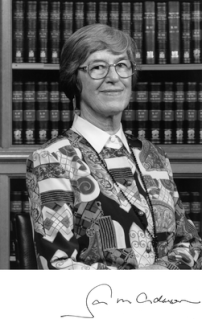A Quote by Anne Lamott
Anything you say from your heart to God is a prayer. But "why" is rarely a useful question. When Job keeps asking God why he has had such loss and suffering, God says, "You wouldn't understand." I always want to know why, and I almost never have a good answer.
Related Quotes
I challenged God. I said, 'God, I know that I'm a sinner. I know that I won't probably have peace until You're in my heart. But I will not let You in my heart until You answer me, why? Why did you take my arms and legs? Why didn't You give me what everybody else has? God, until You answer me that question, I will not serve You.'
The kind of prayer I am talking about is a detached kind of prayer in which you are not looking for anything, just putting yourself in God's presence and sharing with him what you are feeling or what you are suffering. It is the kind of prayer in which you just open your heart to God and say, "God, I'm here. I'm not asking for anything, God. I just want to be near you and open my heart to you."
And my heart beat faster for the mountains of eastern Europe, finally, beat faster for the one hope that somewhere we might find in that primitive countryside the answer to why under God this suffering was allowed to exist - why under God it was allowed to begin, and how under God it might be ended. I had not the courage to end it, I knew, without that answer.
The question is absurd: when you ask, 'If God is both all good and all powerful, why then does He allow suffering?', what you are really asking is, 'If God is both all good and all powerful, why then can He not make me (the questioner) - who is just as much a part of a universe in which there is suffering as is any other part - be at the same time the exact same questioner, but one who is now part and parcel of a universe in which there is no suffering?' Which, reduced down, is the same thing as asking, 'Why can there not be, at the same time, X and the preclusion of X?'
If prayer stands as the place where God and human beings meet, then I must learn about prayer. Most of my struggles in the Christian life circle around the same two themes: why God doesn't act the way we want God to, and why I don't act the way God wants me to. Prayer is the precise point where those themes converge.
I have been asked hundreds of times in my life why God allows tragedy and suffering. I have to confess that I really do not know the answer totally, even to my own satisfaction. I have to accept, by faith, that God is sovereign, and He is a God of love and mercy and compassion in the midst of suffering.
Drawing prayer circles isn’t about proving yourself to God; it’s about giving God an opportunity to prove Himself to you. Just in case you have forgotten — and to ensure that you always remember — God is for you. I can’t promise that God will always give you the answer you want. I can’t promise that He’ll answer on your timeline. But I can promise this: He answers every prayer, and He keeps every promise. That is who He is. That is what He does.
We should, can and most of the time do communicate with God directly. To my knowledge, angels are not necessary for anything. But God's creation is abundant, and asking "Why angels?" would be like asking why there are thousands of varieties of trees or stars, when we could get along with so much less. God Himself told us many times that He was sending angels to love and care for us, so He is the one who brought them into our lives. Therefore, even if we don't understand their entire purpose, I vote that we pay attention to them.
But once a dead God, always a dead God, even resurrected. The Son must have the taste of death forever in his mouth. The Trinity must be tainted by it; there must be a certain stench at the right hand of God the Father. The horror must be real. Why would God wish that upon Himself? Why not leave death to mortals? Why make dirty what is beautiful, spoil what is perfect? -- Love. That was his answer.
A social order bent on producing wealth as an end in itself cannot avoid the creation of a people whose souls are superficial and whose daily life is captured by sentimentalities. They will ask questions like “why does a good God let bad things happen to good people ” such people cannot imagine that a people once existed who produced and sang the psalms. If we learn to say “God ” we will do so with the prayer “My God my God why have you forsaken me?
Is there an answer to the question of why bad things happen to good people?...The response would be…to forgive the world for not being perfect, to forgive God for not making a better world, to reach out to the people around us, and to go on living despite it all…no longer asking why something happened, but asking how we will respond, what we intend to do now that it has happened.







































